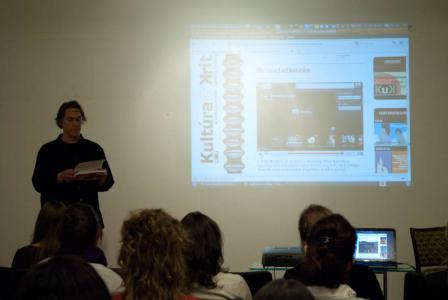KuK-TALK
My name is Silent Quill, I am the chief of a tribe which has been driven to a country Reservation. It is a great honour to stand here and talk to the open ears and hearts of people both young and more mature. Here I have in my hands the printed version of the material of a quite exciting and high standard online endeavour – “a kind of public seminar” – and the volume in the limelight contains a selection of the products of the past two years. And I can talk about it freely to my Native American brothers and sisters. I am happy to be here.
Indeed, what would make an 'Indian' happier and why at such a difficult and trying period, when our culture is only a curse on the lips of white people and gives rise to immediate antipathy? They shoot at us from the hip and before we can say a word they cut us short, they turn us off, and close the book on us, and they don’t even see that we exist. White people don’t look on red people as human beings. It is impossible even to try to swim and carry our culture between our teeth across to the other side, and then present it kindly to the white man with those piercing eyes, claiming we have brought it for him, and that he did not need to worry we haven’t come from the other side, because there is no other side, just this one. This is an island. And here, whether they like it or not, we have to live and die together. This book, which I have carried as culture across between my teeth is evidence. It is evidence of the fact that young people with clear, bright eyes do believe in our culture derisively called “high” and want it and are interested in it so that they are even able to run such a high standard homepage with the help of a few experienced fighters.

This will slightly calm down a desperate ‘Indian ‘and shining joy will warm his heart. There is hope. Of course, as usual, we have nothing left but hope. But this book in my hand is hope with a capital H. This word–even if unspoken– can be heard in the most shocking interview with Mihály Víg. And, in fact “the real problem is that we are unable to forgive.” That’s how a real chieftain should speak. It is worth going to the theatre, to concerts, to the cinema or to exhibitions. It is possible that we are unable to describe the feeling, but still we can get people into or out of the mood to do so, which is enough. We should think of it all instead of just rushing foolishly forward to the next flashy thing as most white people do. And to be able to write about it we have to live and digest what we have seen, heard or read. And all these things can somehow be felt in the texture of criticism.

The writing of a German theologian -chief, Johann Baptist Metz, will be quoted twice. He gives us a warning and calls our attention to thoughts similar to ancient Indian teachings. This is what he says: “If we forget the suffering of others, we forget the end of time, which primarily appears as a hope for justice for sufferers.” Lame Deer interpreted it last century as “Never cease to remember!” Because those who cannot remember, who have nothing to remember to, have no past, no history, thus, those people do not exist. Let me explain over and over again the simple words of Lame Deer. We should never forget who we are.”We are all Indians…” as Péter König sang it in the 80’s.

My name is Silent Quill, I am one of the last leaders of an Indian Reservation in the country. My heart is full of envy. We do not do anything like you do, young warriors, but the other way around. We make online versions, or at least we try to, of printed journals. What you have created with the help of the older chiefs can hold its own in print as well. According to the island Indians, the proof of the online version is in the printing. All I can say about this perfectly edited book of diverse interest, which attempts the impossible is: Kuk! I have spoken.
(translated by Daniella Schwarczkopf)



Facebook-hozzászólások